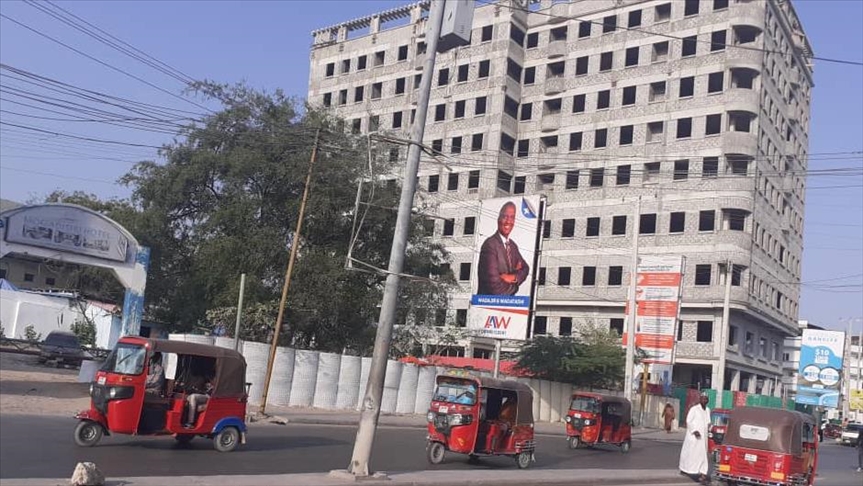
MOGADISHU, Somalia
As Somalia fights the coronavirus pandemic and locust invasion, as well as a humanitarian crisis in the southwestern Bakool region due to al-Qaeda-affiliated terror group al-Shabaab’s blockade, a new controversy has emerged after President Mohamed Abdullah Mohamed’s term ended on Feb. 8.
Political leaders and other stakeholders have so far failed to find a consensus on holding the overdue election in the Horn of African country.
Mahdi Mohamud, a 54-year-old Mogadishu resident, told Anadolu Agency that Somali people must get together and work towards the future of the country.
"We need to come together and hold the leaders of this country accountable to do what is necessary to resolve the current stalemate on the election," he said.
Hussein Kusow, a 34-year-old Rickshaw driver in the capital Mogadishu, said the country has suffered enough since the collapse of the former government in 1990s, and now the people need a real solution, not political wrangling.
“We don't need to suffer anymore. Political leaders in this country, including the head of the state, must lead this country in a better way,” he said.
Unconditional talks only way out
Political analysts believe result-oriented and unconditional talks are the only way out of the current election standoff.
“I think the ideal solution is to resume unconditional talks regardless of the venue with the president taking the lead and heeding the calls for a wider engagement,” Abdimalik Abdullahi, a political analyst, told Anadolu Agency.
This implies bringing in the leadership of the parliament, civil society organizations, women representatives, and opposition groups, so boosting the legitimacy of the process. By doing so, a smooth electoral plan can be easily charted out and implemented, he added.
Somali president proposes new conference
Somali President Mohamed Abdullah Mohamed has called upon regional leaders and the Banadir governor to hold a new election conference in Garowe, the administrative capital of Somalia's autonomous region of Puntland.
The call came days after an election conference among the Somali president, Prime Minister Mohamed Hussein Roble, and regional leaders ended without an agreement in the city of Dhusamareb.
On Feb. 15, the president will host a federal and state-level summit in Garowe, Puntland, on the implementation of the Sep. 17 Elections Agreement, the presidency said in a tweet on Wednesday.
Though all political stakeholders, including the union of presidential candidates led by former President Sharif Sheikh Ahmed, welcomed the new election conference, they supported Puntland’s call for holding the conference in Mogadishu with the participation of the international community.
Chronic delays
Somalia should have had a presidential election before the constitutional mandate of the president expired. But it is not the first time Somalia has missed a presidential election deadline, Adan Aw Hirsi, a Somali politician and academic, told Anadolu Agency.
“Both two presidents preceding Farmaajo stayed in office beyond their constitutional mandates. Sharif Ahmed overstayed for 18 months and Hassan Sheikh went on for six months,” he said.
He added that the previous election talks failed because the leaders of Puntland and Jubaland never showed a willingness to compromise for the common good and they kept changing goalposts whenever the president conceded to their demands.
Is there any constitutional crisis?
According to Abdirahman Abdi, a legal expert in Mogadishu, there is no constitutional crisis as the current parliament adopted a resolution, allowing all constitutional institutions, including the presidency, to stay in office until their successors are elected.
“According to law, the parliament resolution is enough but they must engage and reach a consensus on the election,” he added.
Abdimalik Abdullahi also expressed his optimism about the upcoming election talks.
“I am optimistic that the upcoming summit will end the deadlock. I believe it's quite easy to reach an agreement if the parties concerned make concessions. Voices of reason were calling for a middle ground on the outstanding issues all along and it's something that can be pursued by the leaders,” he added.
Int'l pressure
The international community also urged the Somali leaders to resume talks urgently to reach an agreement, paving the way for national elections to be held as soon as possible.
“We underscore that any alternative outcomes, including a parallel process or partial elections, or any other actions that lack broad agreement, would not obtain the support of partners,” said a recent statement by Somalia's international partners.
The partners called on Somali political leaders to build on the positive aspects of the Dhusamareb discussions and to continue working together to agree on elections in the national interest.
Meanwhile, Somali people called on the international community to stay away from the country’s internal issues.
“International community must support Somalia to overcome the current problems without supporting any political party or pushing a particular agenda,” Asha Hassan Adan, a 27-year-old university student, told Anadolu Agency.
Somalia's opposition leaders opposed any extension, demanding a transition council comprising the parliament speaker, political stakeholders, and civil society representatives.
Anadolu Agency website contains only a portion of the news stories offered to subscribers in the AA News Broadcasting System (HAS), and in summarized form. Please contact us for subscription options.







